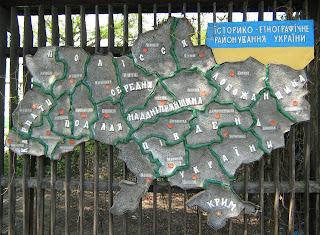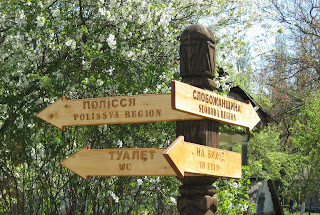Obviously, I can't share all of the pictures and details here, but I'm going to try and give you a snapshot of my excursions over the past couple of weeks.
National Museum of Folk Architecture and Life of Ukraine - MAY 2, 2013
A group of about 12 students from the language school, along with a couple of our teachers, took the day to visit this museum, partly because it was during the Easter exhibition. It was a great opportunity to see some culture, to practice using the languages we've been studying as we interact with each other, and to have a fun excursion together. The weather was beautiful, and it was a great day!
The museum is located on the southern outskirts of Kiev, and is likely named after a village south of Kiev - Pirogova. It is a 1.5-sq. km open-air museum, highlighting the architecture and culture of the different regions of Ukraine throughout the country's history. There are demonstrations of folk art/craftsmanship, lots of places to buy souvenirs and articles from Ukraine's culture, as well as many different buildings to explore...and let's not forget the food area! If I hadn't brought a lunch with me that day, I would have purchased some "sashlik" - Ukrainian kebab-style barbecue - the aromas definitely aroused my appetite!!
This is our group walking onto the grounds of the museum.
This is a map showing the historical-ethnic regions of Ukraine.
I'm standing beside an traditional outdoor root-cellar, which in Russian is the word for "fridge."
This man played beautiful music on this ancient instrument - I'm not entirely sure what it's called.
Inside one of the traditional "huts." You can see a weaving loom on the right and displayed around the room are several items of traditional items that would have been made here.
The weekly schedule for a school in the 19th century Ukraine, including "God's Law" (the first class of the day), Russian language class, mathematics class and singing.
Pottery-making demonstration
Because we went the weekend before Easter, there were a lot of these giant Easter eggs "pysanky" all over the grounds of the museum.
I loved the windmills -- it was just a little disappointing that we couldn't go inside.
Some of the buildings in the Carpathian region of the museum.
This is a multi-directional signpost -- bottom left shows the direction of the nearest "facilities."
This is a large lever above a well, so I assume that it would be used to retrieve large amounts of water from the well below.
I bought a small framed painting from this multi-talented Ukrainian man.
Lots of room to explore, walk and eat picnic lunches...among other things.
The stonework on these historical buildings is very impressive, but most of them had thatched roofs, which I was not particularly keen on.
The construction and furnishings of these homes reminded me of the 1940's-1950's era.
One of the many places to buy Ukrainian clothing, crafts and souvenirs.
I had a specific goal in mind this day -- I wanted to buy a Ukrainian blouse for Easter, and I knew that the street market at Andrew's Descent would have a lot of good choices. I was very successful -- even found some nice accessories to go with the blouse, as well as a few other souvenirs -- and I also enjoyed my excursion into the One-Street Museum, which highlights the history of this area of Kiev.
Andrew's Descent is a 720-metre cobblestone street, which connects Kiev's Upper Town and the historically commercial Podil neighborhood. Historic landmarks marking the descent include the Castle of Richard the Lionheart, 18th-century baroque St. Andrew's Church, and the house of the famous Russian writer Mikhail Bulgakov. The One-Street Museum displays some 6500 articles showing the history of the descent, and representing the lives of the people who lived there.
This is the view from the entrance to the funicular -- the quickest way to get to the top.
View from near the bottom of Andrew's Descent.
Entering the One-Street Museum...
A display of crafts and trade on Andrew's Descent at the turn of the 20th century.
One of the many outdoor cafes along the descent.
This is a monument in the square at the bottom of the descent -- this man was a political and civic leader and a brilliant military leader for the Cossacks.


























No comments:
Post a Comment